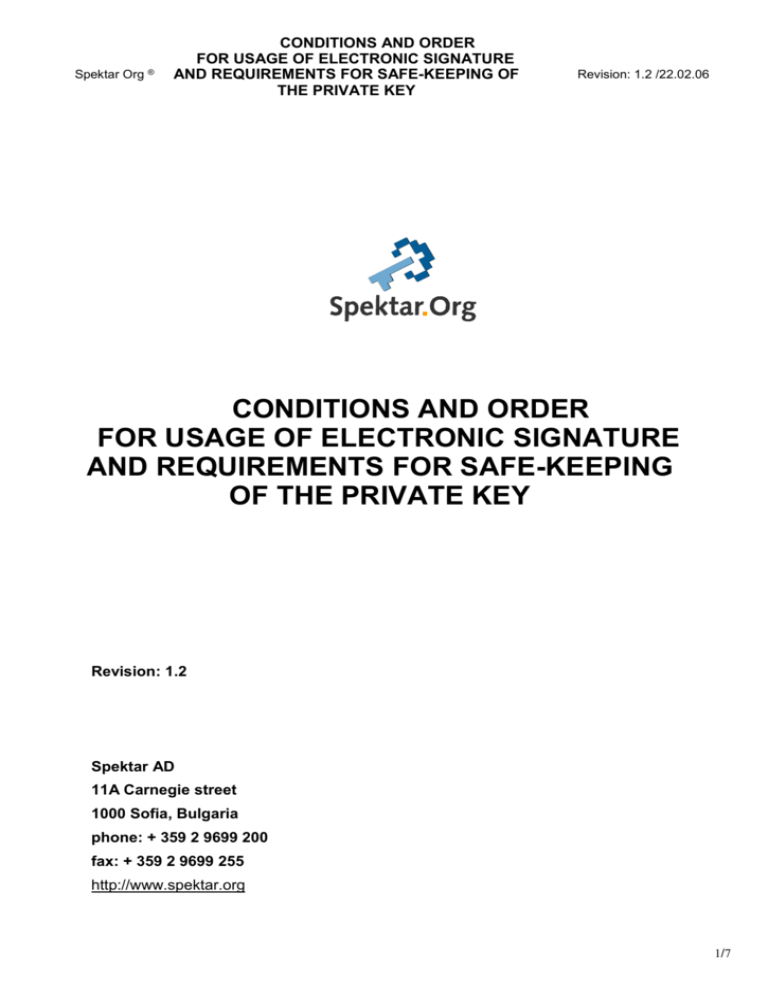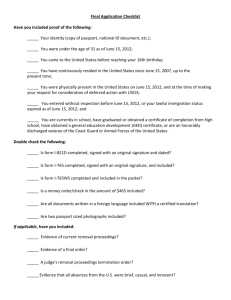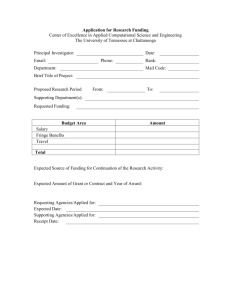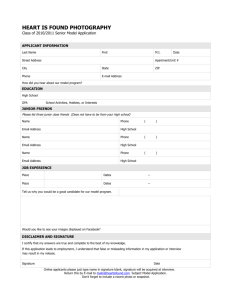2. Electronic signature
advertisement

Spektar Org ® CONDITIONS AND ORDER FOR USAGE OF ELECTRONIC SIGNATURE AND REQUIREMENTS FOR SAFE-KEEPING OF THE PRIVATE KEY Revision: 1.2 /22.02.06 CONDITIONS AND ORDER FOR USAGE OF ELECTRONIC SIGNATURE AND REQUIREMENTS FOR SAFE-KEEPING OF THE PRIVATE KEY Revision: 1.2 Spektar AD 11A Carnegie street 1000 Sofia, Bulgaria phone: + 359 2 9699 200 fax: + 359 2 9699 255 http://www.spektar.org 1/7 Spektar Org ® CONDITIONS AND ORDER FOR USAGE OF ELECTRONIC SIGNATURE AND REQUIREMENTS FOR SAFE-KEEPING OF THE PRIVATE KEY Revision: 1.2 /22.02.06 CONTENT 1. Introduction .............................................................................................................................. 2 2. Electronic signature ................................................................................................................. 3 3. Rules for usage of the electronic signature .............................................................................. 4 4. Management of the certificates for universal electronic signature ........................................... 4 5. Keeping the confidentiality of the private key ........................................................................... 6 6. Authenticity check for electronic signature ............................................................................... 6 1. Introduction This document describes the conditions and order for use of an electronic signature and the rules for keeping the private key of the Owner with which the electronic documents are signed. 2/7 Spektar Org ® CONDITIONS AND ORDER FOR USAGE OF ELECTRONIC SIGNATURE AND REQUIREMENTS FOR SAFE-KEEPING OF THE PRIVATE KEY Revision: 1.2 /22.02.06 2. Electronic signature 2.1. Electronic signature is every piece of information connected with the electronic statement on a way agreed between the Signatory and the Addressee, secure enough for the needs of the revolution, which discloses the identity of the Signatory, the consent of the Signatory with the electronic statement and protects the content of the electronic statement from future changes. 2.2 The signing is done through the use of a key pair and some algorithms of the asymmetric cryptography. These algorithms are shown in the ‘ORDINANCE on the Requirements to the Algorithms of Advanced Electronic Signature’. 2.3. The electronic signature is universal if: - the private key of the Owner is kept on a device for secure creation of signatures (Secure Signature Creation Device), such as a smart card or a hardware crypto-module with level of security according to the ‘ORDINANCE on the Activities of Certification Service Providers, the Terms and Procedures of Termination thereof, and the Requirements for Provision of Certification Services’. - the certificate which certifies the connection between the Owner/Signatory and the private key is issued by a certification services provider. 2.4 The universal electronic signature has the meaning of a handwritten signature regarding everyone. The Council of Ministers defines the state authorities and structures which can use in their relations another kind of electronic signature. 2.5 In exchange of electronic documents with universal electronic signature these are the participants: - Owner; - Signatory; - Relying party; - Registered certification services provider. 2.6 The Owner is a physical or legal person on behalf of whom the electronic statements are signed and this person is stated in the issued certificate for universal electronic signature as the Owner. 2.7. The Signatory is a physical person who on behalf of the Owner draws up and signs electronic statements accordingly to his representative powers and is stated in the issued certificate as the Signatory. 3/7 Spektar Org ® CONDITIONS AND ORDER FOR USAGE OF ELECTRONIC SIGNATURE AND REQUIREMENTS FOR SAFE-KEEPING OF THE PRIVATE KEY Revision: 1.2 /22.02.06 2.8 Relying parties are physical or legal persons – addressees of electronic statements, signed with universal electronic signatures, for which there are certificates for universal electronic signature issued by the provider. 2.9 The Provider is a legal person who issues certificates for the private key of the Signatory of the electronic signature and maintains a public register for checks on the validity of the certificate issued. Spektar AD is in the role of the certification services provider. 3. Rules for usage of universal electronic signature 3.1 When using the universal electronic signature the Owner, Signatory, respectively, shall observe the following: - to adhere to the requirements of the ‘Electronic Document and Electronic Signature Act’(EDESA) as well as the regulation for its application; - to follow the procedure for generating a key pair according to the Spektar AD policy for the respective certificate; - to keep the private key so that access to it is as in ‘ORDINANCE on the Requirements to the Algorithms of Advanced Electronic Signature’; - to follow the publicly announced policies and practices of Spektar AD 3.2 When signing with the electronic signature the Owner, Signatory, respectively shall make sure that the certificate held by him is issued in accordance with the provider’s Policy, which allows the signing of the electronic documents in the particular situation. The updated content of the issuance policies for the Spektar AD certificates can be obtained from the Public register at http://www.spektar.org 4. Management of the certificates for universal electronic signature Management of the certificates issued by the Certification Service Provider(CSProvider) follows the rules implemented in ‘Certificate Policy’ and ‘Certification Practice Statement’. 4.1 Certificate renewal requested by the Signatory with Owner’s agreement 4.1.1 Certificate renewal is a procedure for extending the validity of the certificate without changing the key pair. 4.1.2 Certificates issued by Spektar AD have the validity shown in the Validity field. 4.1.3 For user certificates the validity is 365 /three hundred and sixty-five/ days from the date of issue. 4.1.4 After the validity expires the certificate can be renewed providing there is no change in the data initially given for the certificate. 4/7 Spektar Org ® CONDITIONS AND ORDER FOR USAGE OF ELECTRONIC SIGNATURE AND REQUIREMENTS FOR SAFE-KEEPING OF THE PRIVATE KEY Revision: 1.2 /22.02.06 4.1.5 In case of presence of such changes a procedure for the issuance of a new certificate begins. 4.2 Suspension of the certificate for universal electronic signature 4.2.1 The Certification Services Provider suspends the certificate for a period of time depending on the particular circumstances, but for no longer than 48 hours from the moment of suspension, if there is reason to believe that the certificate should be suspended. 4.2.2 Suspension of certificates can follow one of these circumstances: - on request by the Owner or Signatory, without the obligation to identify him or to establish his representative authorities; - on request by a person for whom because of the circumstances it is obvious that can have knowledge of breach of private key security, such as representative, partner, employee, family member, etc. In cases of immediate danger regarding the interest of third parties or in presence of enough information for violation of legislation, the Chairman of the CRC can oblige the CSProvider to suspend the certificate for a period of time depending on the particular circumstances, but for no longer than 48 hours from the moment of suspension. 4.2.3 Certificate suspension is done by denying access to it. 4.3 Certificate renewal 4.3.1 The Owner of the suspended certificate can request renewal if the reason for suspension no longer exists and after the CSProvider, the Communications Regulation Commission, respectively, makes sure that the Owner has found out the reason for suspension and the request for renewal is made as a result of this finding. 4.4 Suspension of certificate and destruction of the private key 4.4.1 Certificates can be suspended in one of the following circumstances: - discredit of the private key when the Owner or Signatory request suspension personally before the Registration Authority; - the certification validity expires. The private key of the Owner, Signatory, respectively, can be destroyed by: - deleting the content of the key carrier (for example – smart card); - following procedures for initializing a used hardware crypto-module on security, containing private keys; - physical destruction of the information carrier. 5/7 Spektar Org ® CONDITIONS AND ORDER FOR USAGE OF ELECTRONIC SIGNATURE AND REQUIREMENTS FOR SAFE-KEEPING OF THE PRIVATE KEY Revision: 1.2 /22.02.06 5. Keeping the confidentiality of the private key 5.1 Signatories take all responsibilities for protecting the key pair and preventing discredit, disclosure, modification, loss or unauthorized use of their private key. 5.2 Regarding the confidentiality of the private key the Owner and Signatory shall: - provide reliable and safe carrier when the key pair is generated, which includes use of technically reliable equipment and software; - use an algorithm for generating the key pair according to the ‘Ordinance for requirements to algorithms for advanced electronic signature’; - change his access code (PIN) for his card after generating a private-public key pair; - keep and protect his private key against loss and discredit during the whole period of the certificate. 5.3 Owners take full responsibility for omissions or action of persons authorized by them who are delegated to generate, keep or protect their private keys. Every use of the private key is considered action done by the Signatory. 5.4 In case of discredit of the private key the Signatory, Owner, respectively, shall immediately inform the Provider for the initiation of a procedure for the suspension of the certificate, according to 4.8 from the ’Certificate Practice Statement’ of Spektar AD. 6. Authenticity check for electronic signature 6.1 After checking all circumstances concerning the validity of the signature, the addressee of the electronic statement signed by the Owner shall trust and accept that the signature has the legal value of a hand-written signature. 6.2 The validity of the signature is checked by the following: - that the signed electronic statement corresponds to the range and purpose of the certificate according to the issuance Policy. Issuance Policies for the different certificates of Spektar AD are published at http://www.spektar.org; - that the provider issued the certificate functions as a registered certification services provider and is registered as such in the Communications Regulation Commission register; - that the certificate is valid. This shall be checked in the public register of Spektar AD. The electronic signature is legally void in cases when certificate is temporarily suspended or revoked; - validity can be also checked on the website of http://www.spektar.org . Spektar AD publishes data from the certificates issued in an accessible by everyone archive of the 6/7 Spektar Org ® CONDITIONS AND ORDER FOR USAGE OF ELECTRONIC SIGNATURE AND REQUIREMENTS FOR SAFE-KEEPING OF THE PRIVATE KEY Revision: 1.2 /22.02.06 LDAP type. Every user and/or relying party has the right to run a check every time they have to decide whether to trust the information from a certificate. Spektar AD provides possibility for real-time checks of the status of the certificates via the OSCP protocol. Specialized software is needed for such checks. - the electronic signature of the electronically signed statements is valid when it certifies validity throughout the whole chain of certificates to the basic certificate of the provider. The provider is not responsible for damages to the relying parties if the checks described above are not run. 7/7







